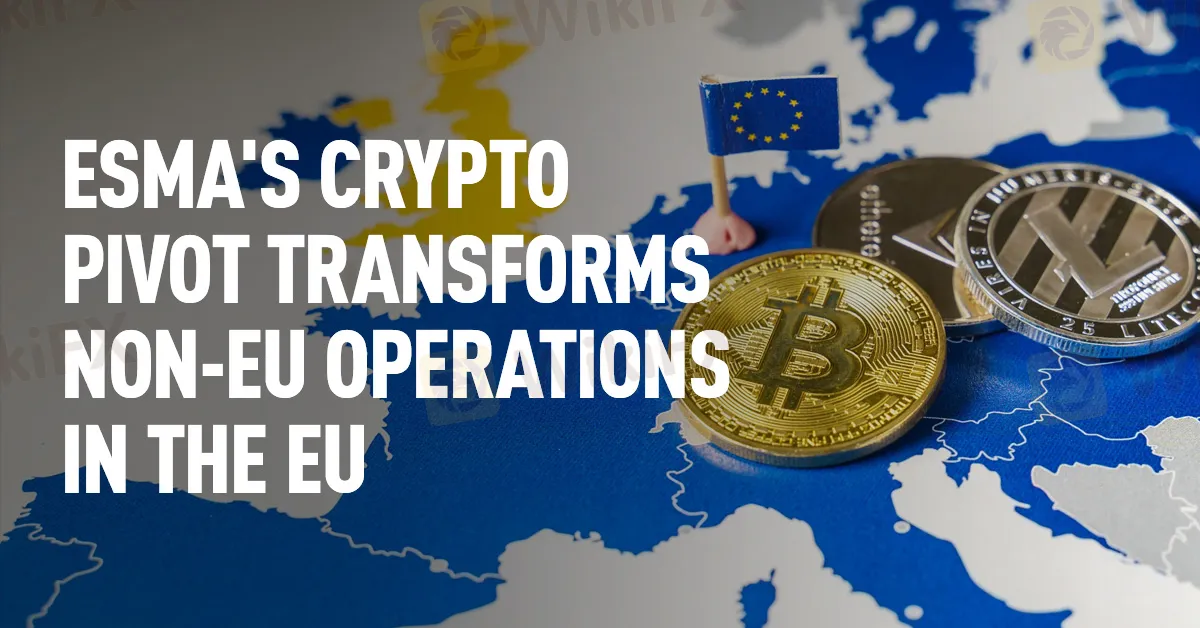简体中文
繁體中文
English
Pусский
日本語
ภาษาไทย
Tiếng Việt
Bahasa Indonesia
Español
हिन्दी
Filippiiniläinen
Français
Deutsch
Português
Türkçe
한국어
العربية
ESMA's Crypto Pivot Transforms Non-EU Operations in the EU
Abstract:ESMA proposes stringent limitations on non-EU crypto firms serving EU clients, emphasizing 'reverse solicitation' as an exception, potentially prompting foreign companies to establish a physical presence within the EU to comply with MiCA regulations.

The European Securities and Markets Authority (ESMA) has introduced a proposal with potential implications for the operations of non-EU crypto companies within the European Union.
The proposed guidelines aim to impose stringent limitations on how these firms serve EU customers directly, intending to curb unfair competition. This initiative follows the EU's enactment of the groundbreaking Markets in Crypto-Assets (MiCA) framework last year, representing a significant stride in regulating the inherently challenging cross-border nature of the online crypto sector.
ESMA's recent proposals, currently open for public consultation until the end of April, seek to provide clarity on the practical application of MiCA, particularly for crypto asset firms located outside the EU. According to ESMA's statement, non-EU firms can only offer crypto-asset services to EU clients if the client exclusively initiates the service, known as 'reverse solicitation,' a concept present in other EU financial laws.
ESMA emphasizes that this exemption should be narrowly interpreted and viewed as an exception rather than the norm. This stance may compel many foreign crypto firms to establish a physical presence within the EU, such as opening a branch or subsidiary, to adhere to the bloc's regulations.

In a commitment to safeguard EU-based investors and MiCA-compliant crypto-asset service providers, ESMA and EU national regulators are determined to hold non-EU entities to the same standards. The proposals strictly prohibit the direct solicitation of business within the EU by non-EU firms, including marketing campaigns.
Moreover, ESMA proposes guidelines to ascertain when a crypto asset should be classified as a “financial instrument,” similar to stocks or bonds. If categorized as such, these assets would fall under the EU's Markets in Financial Instruments Directive (MiFID) rules, introducing an additional layer of regulatory oversight.

Disclaimer:
The views in this article only represent the author's personal views, and do not constitute investment advice on this platform. This platform does not guarantee the accuracy, completeness and timeliness of the information in the article, and will not be liable for any loss caused by the use of or reliance on the information in the article.
Read more

Bybit Shuts Down NFT Marketplace Amid Crypto Market Downturn
Bybit announces the closure of its NFT marketplace, citing efforts to streamline offerings. Discover the latest trends in the declining NFT market and its shift to utility-based growth.

Galaxy Digital Settles $200M in Luna Token Manipulation Case
Galaxy Digital pays $200M to settle Luna token manipulation probe by NY regulators, linked to TerraUSD’s 2022 crash, impacting crypto market stability.

Vanuatu Passes VASP Act to Regulate Crypto and Digital Assets
Vanuatu's new VASP Act regulates crypto businesses, enforcing strict licensing, AML/CFT compliance, and investor protections.

Blockchain Decentralization: Empowering a Trustless Future
In recent years, blockchain technology has rapidly evolved from a niche innovation behind Bitcoin into a transformative force across industries. At its core, blockchain decentralization refers to the distribution of authority and decision-making away from a central entity and into the hands of a distributed network of participants. This shift redefines how data is stored and verified and paves the way for trustless, transparent, and resilient systems that challenge traditional centralized models.
WikiFX Broker
Latest News
The Withdrawal Trap: How Scam Brokers Lure Victims into Paying More
FCA to Investors: Think Twice Before Trusting These Brokers
Trump\s tariffs: How could they affect the UK and your money
Trump gambles it all on global tariffs he\s wanted for decades
TradingView Brings Live Market Charts to Telegram Users with New Mini App
Trump tariffs: How will India navigate a world on the brink of a trade war?
Interactive Brokers Launches Forecast Contracts in Canada for Market Predictions
Authorities Alert: MAS Impersonation Scam Hits Singapore
Stocks fall again as Trump tariff jitters continue
IG Group Acquires Freetrade for £160M to Expand UK Investment Market
Currency Calculator







